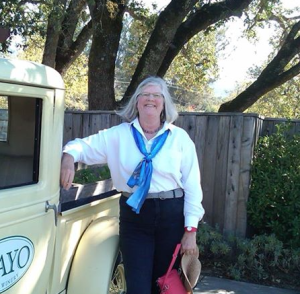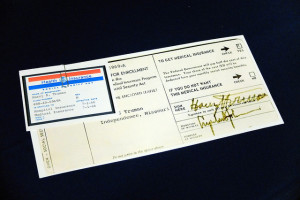Today, in the second part of a two-part interview, SevenPonds spoke with Pat Macholl, a volunteer counselor with Legal Assistance for Seniors/Alameda HICAP. Her San Francisco-based office helps clients learn how to navigate their healthcare benefits through Medicare. Macholl teaches people about their benefits at the end of life, as well as preparations for retirement, across the county.
 Marissa: I asked you earlier about what made you join this organization, and you said you were surprised that your work helped people as much as it did. Can you tell me about a few of your most memorable moments?
Marissa: I asked you earlier about what made you join this organization, and you said you were surprised that your work helped people as much as it did. Can you tell me about a few of your most memorable moments?
Pat: Oh yes. Well, first of all, the level of assistance varies depending on who walks into my office each day. A lot of times, people will be so grateful to me, when I don’t feel as though I did much for them at all. The first memorable person was the woman I told you about earlier. I was struck by how horribly important it was to her to pay her bills on time. Even when she was struggling to survive, that was still important to her.
I see people with courage. One couple came in to my office with their two children. The child was challenged with a disability, and the parents were in their late 50s. I couldn’t help but think, “My god, look what’s going to happen to these children if they lose their parents. Who will take care of them?” I think about them a lot.
Another woman came in with her son, who was this beautiful young guy in his 20s. He had a traumatic brain injury, but he had very little medical coverage. I remember him well, because there was just nothing I could do for him. Now, typically you need at least 40 quarters of earning history with your employer to qualify for the type of benefits he needed to pay off his medical bills. He had been in a horrible accident, so he went from being a useful employee at his company to being completely incapacitated. His insurance premiums skyrocketed. It was heartbreaking for me to tell him that I couldn’t help. I had to force myself to move on from it, even though I was heartbroken.
Marissa: Wow. Do you find that most people who come to you for help are in situations like that?
Pat: Sometimes. Most of the time, we get a lot of people who have no idea that they even qualify for benefits. You know, it’s always funny to me to see what people’s idea of being broke looks like (laughs). Remember that woman who was trying to live on less than $1,000 per month in San Francisco, and thinking she was doing fine? I remember one day one of our volunteer coordinators came into my office just fuming. He had gotten off the phone with a woman who complained to him about how little money she had, and that she was completely broke. When he asked her how much she made to see if she qualified for benefits, he found out she makes more than he does! Your sympathy dries up at that point (laughs).
Marissa: I used to work in medical billing, so believe me, I know that feeling (laughs). When I was working, I also remember that a lot of people who came into my office had no idea what their insurance required. What tips can you give our readers about finding their own benefits?
Pat: See, I knew I liked you! (laughs) The number one tip I wish more people knew is that paperwork is a huge part of requesting medical benefits. If you come in to my office without all of the paperwork you need, then there’s not much I can do for you. I remember what it was like before I did this work. We tend not to pay attention to the paperwork because there’s usually so much of it. I tell people, “Bring everything, every single piece of paper you’ve received, even if you don’t think you’ll need it.” People don’t read that stuff. They can’t! Sometimes the print is so tiny, and the language is so confusing, that it really does take an expert to figure it out. I knew a woman who was a doctor of psychology; she was so intelligent, but she gets nothing out of her insurance paperwork when she reads it.
Marissa: How do you navigate your sessions with people?
Pat: I start with a few questions. First, what do you have going on right now that we need to handle? Then, what are you going to face in the future? What are you going to need? Sometimes, this takes multiple appointments because people never think ahead about what they might need 10 years from now.
Marissa: How does this connect to end-of-life care?
Pat: People with lives that revolve around medical appointments absolutely need this sort of guidance. There are too many choices, and that makes many of us freeze. I like the people I work with to think about their needs before I point them in the right direction. I walk them through each decision until they are comfortable making the choice for themselves. I see plenty of caretakers who are worried about coping with the loss of their loved ones, and that makes it tough to make these decisions. I go over what hospice care means, and whether they need this option based on their medical history. I point them to Medigap if they just have some ongoing medical needs. I walk them through Part D prescriptions, and how to get their insurance to cover their medications.
With regard to end-of-life specifically, I believe that everyone should have an advanced directive and power of attorney granted to someone they trust. In the event that something happens to them, it also helps me get them the coverage they need when they’re not able to get it for themselves. They have these wallet-sized cards these days that have all of your vital information on them: who your doctor is, what prescriptions you take, whether you want to be intubated. All of these benefits vary by state, so I recommend everyone looks up their own county to find these resources.
Marissa: Thanks so much, Pat, for speaking with us!
Pat: Thank you!
Pat Macholl’s Step-By-Step Guide for Checking County Benefits:
1. Visit medicare.gov and look at the menu at the top of the screen.
2. Click on the Forms, Help and Resources tab.
3. Select “get help paying costs.”
4. On the right, under the box labeled “find someone to talk to,” select your state.
5. Call the phone number listed under SHIP — State Health Insurance Assistance Program.
To read Part One of our interview with Pat, follow the link here.

 Where Do You Find Medicare Resources for Your End-Of-Life Care? An Interview with Pat Macholl, Part Two
Where Do You Find Medicare Resources for Your End-Of-Life Care? An Interview with Pat Macholl, Part Two



 Passing of Beloved Comedian Births a New Comedy Festival
Passing of Beloved Comedian Births a New Comedy Festival

 The Spiritual Symbolism of Cardinals
The Spiritual Symbolism of Cardinals














